A Few Marker Sketches From Last Year's Inktober



A few marker sketches from last year's Inktober
I haven't posted in a while, so I'll be adding some of the work I've been doing for the last couple years.
More Posts from Exobiotica and Others




In my orange phase.





Herders
Out on the plains, a group of herders watches over its flock. At around 15 feet in height, the Magnavindix have flat tops, good for catching the sun’s rays to supplement their energy requirements through photosynthesis. The majority of their sustenance however, comes from the placid, defenseless Iumentus creatures they tend to. Imposing in stature and well armed, they play the role of defender, shepherd, and also matchmaker, bringing a pair of Iumentus together when their biolights signal readiness to breed. Indeed this symbiosis has grown so exclusive that the Magnavindix have evolved specialized appendages that are only useful in carrying the Iumentus. Having no concern for danger, the livestock are free to grow fat and slow as they wander the open plain, grazing on the expanse of the fibrous purple carpet creature that dominates this land. Other species benefit from this arrangement too. The shy Brush-faced Verecundas stay close to the herd as their giant guardians deter nearly all predators that would attempt to approach.




Here is a nocturnal view of a habitat in which the inhabitants have evolved extreme forms of bioluminescence. The vertical glowing blobs are the reproductive bulb form of a species with a complex life cycle (to be elucidated in following artworks). The groove-backed, ravenous creatures at the bottom are of the same species as the glowing blobs, but at a different life stage. At center is a rather placid, slow-moving consumer of the bulbs- one who has incorporated its own form of bioluminescence into its respiratory apparatus as a means of camouflage. Names and descriptions will come as soon as possible.
I saw you're a graphic designer.
Are you commissionable for creature designs or similar projects?
If not that's OK. Like your art
I’m not currently available for commissions, sorry. I definitely will keep making art though. Glad you like it!

This was a colored-pencil rendering of the creatures involved in the ecosystem portrayed in the "Aglow" piece. The pancake creatures on the floor are mobile decomposers. The floating lanterns are semi-autotrophic creatures that travel in groups. They travel by spouting air directionally through their vents which are visible along the middle of their bodies.





A Giant Forest Walker
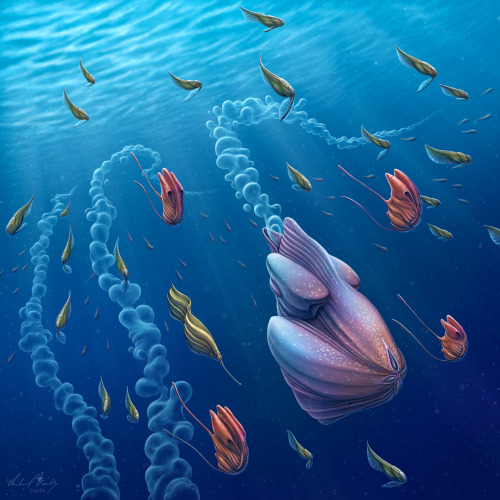
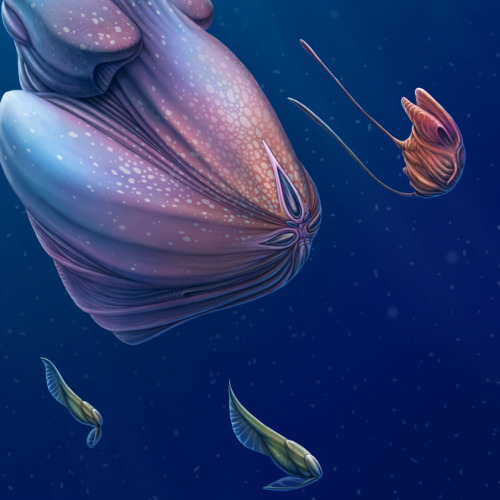
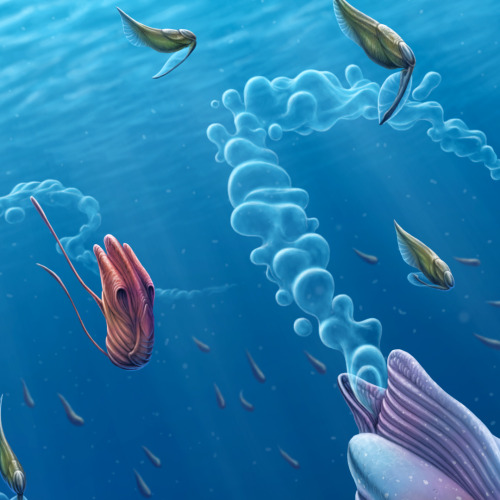
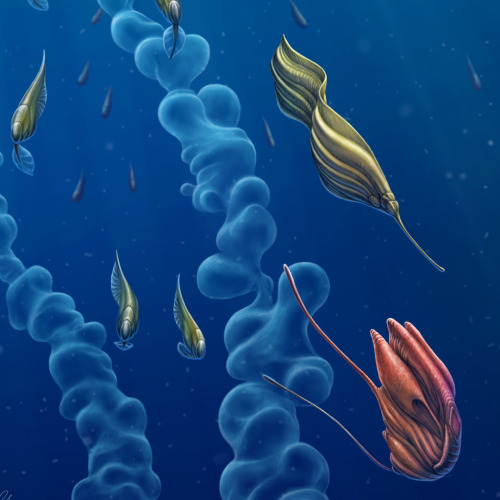
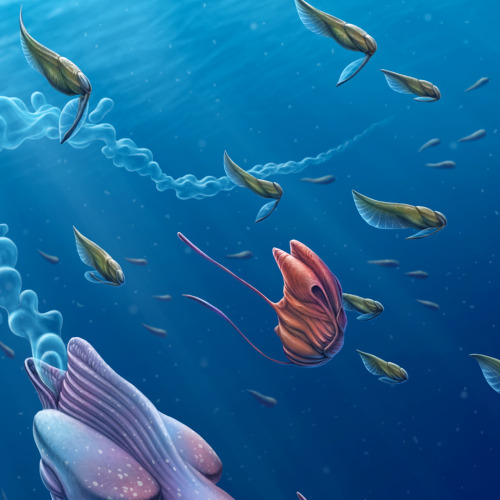
Back to the Depths
An entourage of opportunistic creatures accompanies the deep-sea behemoths during their brief ascent to the surface. Releasing their gelatinous strings of embryos here in the sunlight has a significant benefit - there's far more visibility. The swarm of followers are here in search of a quick meal in the form of the gelatin, which is full of valuable protiens and nutrients. After the feast however, the recipients of this apparent windfall become unwitting hosts for the behemoth's multitudinous offspring, which were embedded in the gel. Adapted to develop inside a wide variety of pelagic creatures, the young grow internally - and sometimes even on the surface of - their hosts until such time as they detach and sink back into the darkness. For most host species, this seems to be a mutually-beneficial symbiosis. At the beginning they receive a large and valuable meal, and usually incur very little detriment due to their temporary parasites. The young behemoths will hide in the dark depths for many years until attaining the size necessary to return to the light and repeat the ancient cycle again.

Sky Shepherds
Caelumopilio pictoratus
This work serves as the official kickoff for my illustration project called "Exobiotica". The creature pictured is a Sky Shepherd. As its name implies, it carries on an aerial existence - maintaining neutral buoyancy via internal hydrogen compartments. The front appendages serve two functions- they are used to physically herd or corral the species of floating creature they subsist on, and also they are equipped with color-changing tissue that is used as communication between members of their group. Like them, most of their predators and prey are essentially floating gas bags which are highly susceptible to rupture. Thus, the Sky Shepherd evolved sharp appendages for use in attack and defense. Propulsion in any direction is achieved by the intake of air at the ventral posterior end, and then subsequent directional exhalation of the air through any of the four siphons. The next work will I produce will feature these creatures and their prey in their aerial environment.




The climate in this region is usually hot and dry, punctuated by sporadic torrential downpours. After such events, the ground flourishes with a dense interconnected web of growth taking advantage of the temporary hydration. Once all the water dissipates, the soil is left to crack in the heat of the day. During these times Ponderosus are on the move, searching for the last remaining vernal pools. They used the times of plenty to fill up on nutrients, but now during a drought they switch primarily to photosynthesis to meet their energy needs. The smaller, dish-faced Lanx are not so lucky. Embedded in the ground unable to move, they must simply go dormant if the rains do not arrive soon enough. For now they point their open frills at the sun and gather energy while they still can. A Stealthspring prowls the scene looking for unfortunate small creatures who may not be faring well in the heat. Their predominant walking style requires a different gait for front and back sets of legs, but if needed their whole body becomes a giant spring, allowing them to burst forward for great distances. In an environment where major features like the ponderosus can move, it can be difficult to navigate from day to day, so the stealthspring must be ready to take flight at any time, should danger come calling.





Sunworshipper
By our terrestrial standards, the coloration on this creature may seem vivacious or even gaudy, but in its native habitat it actually serves as cryptic camouflage. Its planet orbits a star with different color output than our own, and photosynthetic systems have adapted to reflect a different color than our earthly green plants. The sunworshipper, like many other mobile creatures here, receives a portion of its energy from photosynthesis - as evidenced by the specially-adapted appendages radiating from its body.
-
 tundragravedigger reblogged this · 8 months ago
tundragravedigger reblogged this · 8 months ago -
 tundragravedigger liked this · 8 months ago
tundragravedigger liked this · 8 months ago -
 ara6gir liked this · 10 months ago
ara6gir liked this · 10 months ago -
 jayjayzzzzzz liked this · 1 year ago
jayjayzzzzzz liked this · 1 year ago -
 ebullient-prism liked this · 1 year ago
ebullient-prism liked this · 1 year ago -
 crepuscular-girlthing reblogged this · 1 year ago
crepuscular-girlthing reblogged this · 1 year ago -
 crepuscular-girlthing liked this · 1 year ago
crepuscular-girlthing liked this · 1 year ago -
 wtrotsky-blog liked this · 1 year ago
wtrotsky-blog liked this · 1 year ago -
 spiffyspidr liked this · 2 years ago
spiffyspidr liked this · 2 years ago -
 jailqueen reblogged this · 2 years ago
jailqueen reblogged this · 2 years ago -
 jailqueen liked this · 2 years ago
jailqueen liked this · 2 years ago -
 butyrospermum-parkii liked this · 2 years ago
butyrospermum-parkii liked this · 2 years ago -
 noodle-of-war liked this · 2 years ago
noodle-of-war liked this · 2 years ago -
 emmanuelmorenoartistaplasti-blog liked this · 2 years ago
emmanuelmorenoartistaplasti-blog liked this · 2 years ago -
 walkingmybird liked this · 2 years ago
walkingmybird liked this · 2 years ago -
 opportunistic-old-one liked this · 2 years ago
opportunistic-old-one liked this · 2 years ago -
 the-demon-colonel liked this · 2 years ago
the-demon-colonel liked this · 2 years ago -
 shitou456 reblogged this · 3 years ago
shitou456 reblogged this · 3 years ago -
 shitou456 liked this · 3 years ago
shitou456 liked this · 3 years ago -
 viic-chan liked this · 3 years ago
viic-chan liked this · 3 years ago -
 sporesman reblogged this · 3 years ago
sporesman reblogged this · 3 years ago -
 omegaxenonaut liked this · 3 years ago
omegaxenonaut liked this · 3 years ago -
 hisserdeer liked this · 3 years ago
hisserdeer liked this · 3 years ago -
 jeremy-remy-davis liked this · 3 years ago
jeremy-remy-davis liked this · 3 years ago -
 squirrel-stars liked this · 3 years ago
squirrel-stars liked this · 3 years ago -
 sanktpolypenbourg reblogged this · 3 years ago
sanktpolypenbourg reblogged this · 3 years ago -
 annoyingalchemist liked this · 3 years ago
annoyingalchemist liked this · 3 years ago -
 myrdin92 liked this · 3 years ago
myrdin92 liked this · 3 years ago -
 mrbgs101 liked this · 3 years ago
mrbgs101 liked this · 3 years ago -
 spiderlingbriary reblogged this · 3 years ago
spiderlingbriary reblogged this · 3 years ago -
 spiderlingbriary liked this · 3 years ago
spiderlingbriary liked this · 3 years ago -
 xaphanfawks-blog liked this · 3 years ago
xaphanfawks-blog liked this · 3 years ago -
 tom-tomorrow reblogged this · 3 years ago
tom-tomorrow reblogged this · 3 years ago -
 ya-boy-husk liked this · 4 years ago
ya-boy-husk liked this · 4 years ago -
 dozen-times-vanished liked this · 4 years ago
dozen-times-vanished liked this · 4 years ago -
 iamthekaijuking liked this · 4 years ago
iamthekaijuking liked this · 4 years ago -
 bugs-are-buddies liked this · 4 years ago
bugs-are-buddies liked this · 4 years ago -
 seekeroftheextraordinary liked this · 4 years ago
seekeroftheextraordinary liked this · 4 years ago